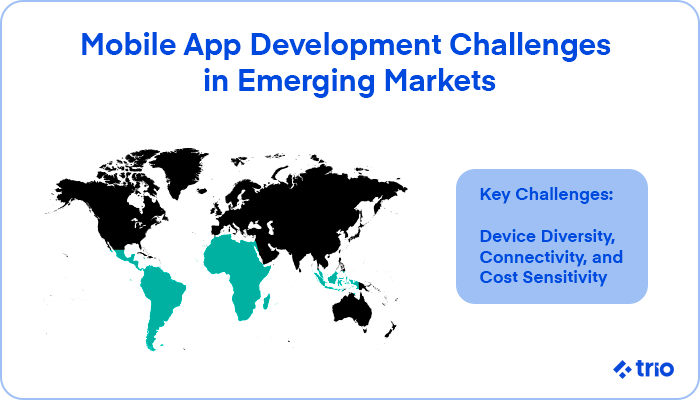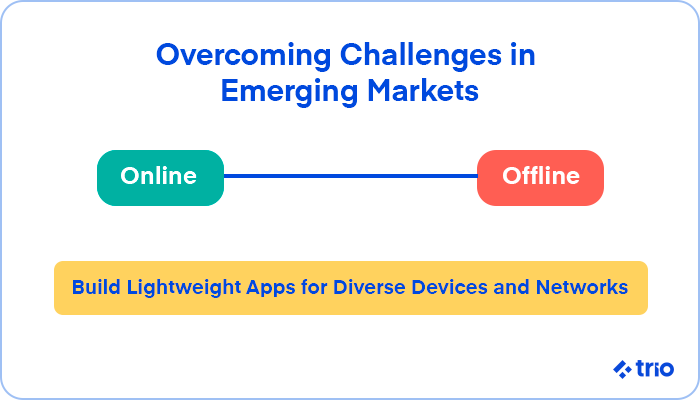Breaking into the mobile app market is an exciting venture, especially in emerging markets where digital adoption is soaring.
However, navigating this landscape requires a clear understanding of the unique challenges developers face.
Whether you’re addressing diverse user needs or managing infrastructural limitations, success in these regions hinges on strategy and adaptability.
Often, this means finding experienced developers who you can trust at a reasonable cost. That is where Trio can help you.
Here at Trio, we have spent many years focusing on retaining top-developer talent. Our developers all have many years of experience and a proven track record of technical performance and effective client communication.
Additionally, through offshore and nearshore outsourcing and staff augmentation, we are able to provide services at a reasonable cost without compromising the work quality.
Let’s explore the challenges of mobile app development for emerging markets and offer actionable solutions that we have come across to overcome them.

What Are the Biggest Mobile App Development Challenges in Emerging Markets?
Emerging markets, characterized by rapid mobile adoption and dynamic economic growth, are filled with opportunity.
However, your developers must be ready to tackle device diversity, cost sensitivity, and regulatory complexities. Tailored approaches are the foundation of success here.
Understanding the Unique Challenges in Mobile App Development
In many regions that are proving to be emerging markets, mobile-first internet access is the norm, and infrastructure often lags behind that of more developed areas that you might be familiar with.
This means your app needs to be lightweight, efficient, and compatible across a wide range of devices – from high-end smartphones to basic models from several years ago.
Price-sensitive consumers also expect more for less.
Apps that can operate offline or use minimal data are highly valued, as unreliable internet connections and high data costs are common hurdles.
It’s essential to offer users something that fits both their needs and their economic realities.
Identifying Key Obstacles for Mobile App Developers
The key challenges include device compatibility and performance optimization.
In emerging markets, users often operate on older or lower-end devices. This makes it essential to create apps that minimize data consumption, memory usage, and battery drain – all while maintaining a seamless user experience.
Beyond technical barriers, infrastructure limitations such as poor network coverage and intermittent power supplies are major obstacles.
Your app must be designed to work efficiently under these conditions, offering offline capabilities or leveraging Progressive Web Apps (PWAs) to ensure accessibility even with limited connectivity.
Localization is another critical factor. Offering language support and adapting your design to meet diverse cultural expectations can be the difference between success and failure in these markets.
You’ll also need to consider regulatory factors like data privacy laws and local compliance requirements, which vary widely across regions.
Since laws and regulations can vary even within a single country, they can be easy to misunderstand. It is even easier to make mistakes due to a lack of information.
We recommend adding a seasoned developer with this knowledge to your
Strategies to Overcome Development Challenges
Over our many years of experience working with startups and emerging innovators here at Trio, we have seen that Agility and adaptability are the keys to success.
Thorough market research is essential to understanding the specific needs and pain points of your target users.
Outsourcing development or augmenting your team with specialists who have experience in these markets can give you a competitive edge.
Trio is uniquely positioned to provide tailored solutions for companies looking to outsource development or augment their teams.
By leveraging highly skilled developers with regional expertise for places like Latin America, Africa, and Eastern Europe, you can ensure your app is optimized for local conditions, reducing time to market without sacrificing quality.

How Does Mobile Technology Influence App Development in Emerging Markets?
Impact of Mobile Devices on Development Processes
In the regions of emerging markets, users may operate a wide spectrum of devices. We have already mentioned how this might encompass anything from the most basic to high-end models.
Ensuring your app performs well across this range is crucial. Lightweight apps with efficient memory and data usage are essential, in our opinion, especially since many users face high mobile data costs.
To successfully create these, you need a developer proficient in coding as efficiently as possible and who knows how to use tools and frameworks to further reduce app requirements.
We have plenty of developers on hand with just this kind of experience who have a track record of successful collaborative software development and implementing sustainable software development practices.
Adapting to Different Mobile Operating Systems
We have seen that Android may dominate in many emerging markets, but ensuring compatibility with other systems like iOS is key to capturing a broader audience.
Cross-platform mobile development tools like React Native or Flutter streamline this process, allowing you to maintain a single codebase across multiple platforms.
Trio’s dedicated teams are skilled in cross-platform mobile development, enabling you to deliver high-quality apps across devices and ensuring smooth functionality and seamless user experiences regardless of hardware or operating system.
Leveraging Cross-Platform Development for Success
Cross-platform app development offers distinct advantages.
By developing one codebase for multiple platforms, you save time, cut costs, and maintain consistency.
Trio’s developers can help you leverage this approach effectively, ensuring that your app reaches a wide audience without compromising on quality.
In mobile development, adopting a cross-platform strategy is crucial for reaching users across diverse devices and operating systems efficiently, but also accelerates time-to-market.
Time is essential in today’s competitive mobile development landscape.
App development companies that prioritize cross-platform development can offer clients more flexible, scalable mobile applications and solutions, making them stand out in fast-growing emerging markets.
What Are Common Challenges in Mobile Application Development?
App development, regardless of the market, comes with its fair share of challenges.
However, when dealing with emerging markets, the hurdles can be even more pronounced due to technical, user, and team management issues.
As a mobile application development company, you will probably face unique challenges in these regions, many of which we discussed above.
By addressing these issues early, you can ensure a smoother user experience and improve app performance across different devices and infrastructures.
Technical and Software Development Issues
When developing apps for emerging markets, technical challenges such as bugs, performance issues, and optimization become more pronounced due to the lower-end devices, which have less processing power and storage capacity.
Additionally, limited internet connectivity in many areas can negatively impact the user experience.
Your developers must focus on optimizing apps for minimal data usage, ensuring offline functionality, and conducting rigorous quality assurance testing to ensure smooth performance on a wide range of devices.
Understanding User Needs in Diverse Markets
Emerging markets are not monolithic – they consist of highly diverse populations, each with distinct socio-economic and cultural backgrounds.
This diversity means that users have varying levels of digital literacy and different expectations when it comes to technology.
If you do not have direct access to a developer or specialist from these regions, we recommend you invest time in understanding these nuances to create apps that resonate with local users.
For instance, the demand for financial technology services like mobile payments in underbanked regions or telemedicine in areas with limited healthcare access presents unique opportunities for tailored solutions.
Industries like finance, education, and healthcare are especially promising.
Apps that address critical needs – such as e-learning platforms or microfinance tools – can significantly improve users’ quality of life while achieving strong engagement and adoption.
Managing Development Teams Effectively
Managing remote teams or working with outsourced developers adds another layer of complexity to app development, particularly for emerging markets.
Whether it’s dealing with different time zones, ensuring smooth communication, or maintaining consistent quality, effective team management is critical to success. This is where outsourcing or staff augmentation becomes invaluable.
At Trio, we offer highly skilled developers who can seamlessly integrate with your existing teams thanks to their strong team culture alignment, which provides the flexibility needed to scale projects efficiently while maintaining high standards.
By leveraging experts familiar with the challenges of emerging markets, you can avoid delays, reduce costs, and keep development timelines on track.
How Can App Developers Navigate the Mobile App Market?
Successfully navigating the mobile app market in emerging regions requires thorough competitor analysis, intuitive design, and strategic marketing.
Analyzing Competitors and Market Trends
A solid competitor analysis helps you understand the market landscape, identify gaps, and discover opportunities for differentiation.
One great technique that some of our clients have used is studying existing apps. By doing so, you can tailor your features to solve unmet needs, ensuring your app stands out.
Monitoring market trends is equally important, as it enables you to anticipate shifts in user behavior – whether that’s a growing demand for e-commerce or increased interest in educational tools – and adjust your strategy accordingly.
In emerging markets, staying agile is very important. Economic and cultural shifts can rapidly change user expectations, and apps that adapt quickly will maintain their relevance.
Best Practices for Successful App Design
At the heart of any successful app is user-centric design.
In an emerging market, this often means prioritizing localization. This can be done through everything from language support to culturally relevant design elements that can drive adoption.
One of our UX/UI experts has also emphasized the importance of intuitive navigation, fast performance, and responsive design, which are key, especially for users who may be interacting with apps for the first time or using lower-spec devices.
The design should also take into account regional preferences.
For example, users in some areas might favor simpler interfaces with fewer options, while others might appreciate richer feature sets with more customization.
Accessibility is equally important, ensuring that all users, regardless of literacy levels or tech familiarity, can navigate the app seamlessly.
Maximizing Visibility in App Stores
Getting your app noticed in competitive app stores requires careful App Store Optimization (ASO).
This includes selecting the right keywords, writing compelling descriptions, and optimizing visual elements like app icons and screenshots to attract potential users.
We have also personally seen how positive reviews play a significant role in boosting visibility on most platforms, so consider incorporating feedback loops that encourage satisfied users to leave high ratings.
A strong launch strategy can further enhance visibility.
Pre-launch marketing, in-app incentives, and partnerships with influencers or local brands can help you build momentum and ensure that your app reaches your intended audience from day one.
What Are the Key Considerations for Developing Mobile Apps in Emerging Markets?
Understanding Local User Preferences and Behavior
In our experience, cultural, social, and economic factors heavily shape how users interact with technology.
For example, integrating mobile fintech solutions is essential in regions with limited access to traditional banking as there is minimal competition and high demand.
Similarly, ensuring offline functionality is critical where internet connectivity is unreliable or expensive. Customizing features like language localization and regional content is key to meeting local preferences.
As mentioned, your developers should also consider regional behaviors – such as how users prefer simple, low-data apps or prioritize cost-effective solutions due to limited disposable income.
Understanding these nuances is crucial to creating an app that resonates with users on a personal and functional level.
Tailoring Features for Diverse Market Needs
Urban users may value robust mobile banking solutions, while rural communities might need tools for agricultural management, such as weather updates or crop market prices.
Likewise, there might be other differences within a market that lead to diversity. These can be as simple as gender, age, and wealth but may also involve intricate cultural and even religious differences that you may struggle to grasp.
Developers must customize their app features based on these unique user needs to achieve stronger adoption and user retention.
Budgeting and Resource Allocation in App Development
Resource allocation is always a priority, but it becomes especially critical in emerging markets where budgets can be tight.
You should build trust in software partnerships with developers who carefully prioritize features that deliver the most value to users, ensuring that you create scalable mobile applications.
Smart budgeting also involves investing in cross-platform development, which can reduce costs by allowing a single codebase to serve multiple operating systems.
Working with experienced development teams, like those at Trio, can help businesses manage these resources efficiently, ensuring projects are completed on time and within budget while still meeting the unique needs of emerging market users.
What Are the Future Predictions for Mobile App Development in 2026?
Emerging Trends in Mobile Application Development
Technologies such as artificial intelligence (AI), machine learning (ML), and augmented reality (AR) are no longer futuristic concepts – they’re quickly becoming essential tools for app developers.
AI-powered chatbots, for example, can deliver personalized customer support, while ML algorithms enhance user experiences by predicting preferences and adapting to behaviors.
In regions with limited access to human resources, these technologies can bridge service gaps efficiently.
In addition, AR is revolutionizing education, retail, and healthcare by creating immersive, real-time experiences that are accessible even on lower-end devices.
This technology offers incredible potential for sectors like e-commerce and telemedicine, where enhanced engagement can significantly impact user satisfaction.
Anticipating Changes in Mobile Technology
With the rollout of 5G networks, developers need to rethink how their apps leverage faster, more reliable internet connections.
The introduction of low-latency networks will enable smoother video streaming, faster app responses, and seamless real-time interactions – features essential for sectors like gaming, social media, and live-streaming services.
At the same time, devices are evolving.
Foldable phones and other innovative form factors are gaining traction, and developers will need to ensure their apps adapt to various screen sizes without compromising user experience.
Apps that are optimized for new hardware can attract a wider audience and gain a competitive advantage.
Preparing for the Next Wave of Development Challenges
With these advancements come new challenges. As mobile apps handle more sensitive data – especially in sectors like finance and healthcare – data security will be paramount.
Developers need to stay proactive by implementing end-to-end encryption, multi-factor authentication, and strong privacy protocols to build trust with users and protect their information through secure mobile app development.
Additionally, sustainability is becoming increasingly important to both consumers and developers. Mobile apps that are energy-efficient and prioritize green technology will align with growing environmental concerns.
By reducing the app’s carbon footprint through sustainable software development practices – whether by limiting data usage or reducing power consumption – you can meet the demand for responsible technology.
Navigating these trends and challenges requires expertise and foresight.
By partnering with experienced teams like those at Trio, you will not only stay ahead of the curve but also deliver impactful, innovative solutions that stand out in competitive markets.
These markets offer incredible opportunities for mobile app developers ready to embrace the challenges of diverse user bases, infrastructure limitations, and fast-evolving mobile technologies.

Ready to break into emerging markets? Contact Trio today to learn how our outsourcing, staff augmentation, and dedicated teams can help you turn your vision into a reality.





